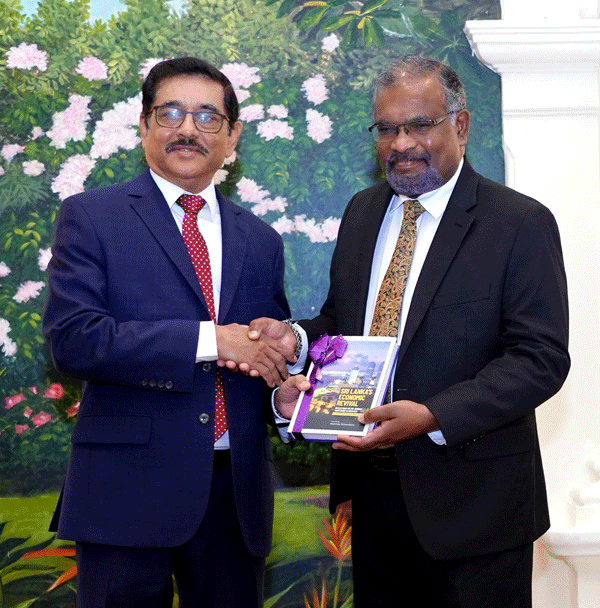The importance of diversification of Sri Lanka’s export markets is evident more than ever following last week's announcement by the United States of its intention to impose 44% tariffs on Sri Lankan exports, Treasury Secretary Mahinda Siriwardana stated.
Speaking during the Launch of his Book “Sri Lanka’s Economic Revival" yesterday (8), Mr Siriwardana said that the impending US tariffs on Sri Lankan exports has exposed this vulnerability as 23% of Sri Lanka’s exports are destined to the US market.
"The concentration of Sri Lanka’s exports, both in terms of products (apparel remains a dominant product) and markets (around 50% of exports are to the US and European Union), has long been highlighted as a key weakness and vulnerability of Sri Lanka’s economy. Contemporary global trade is based on fragmented production in regional and global value chains, requiring strong trade and investment institutions to ensure predictability of the trade regime. That is why comprehensive trade agreements are a crucial element of engaging in regional value chains and expanding exports. Robust trade institutions, such as trade agreements, become all the more important in a global environment of uncertainty which has become very evident today," he stressed.
"Now, more than ever, it is crucial that Sri Lanka accelerates its efforts to penetrate new markets, particularly in South East Asia and India, such that Sri Lanka can integrate into regional value chains to benefit from the dynamic Asian economies. It is crucial to improve Sri Lanka’s resilience to global shocks through a diversification of export products and markets and address this longstanding legacy issue as a risk mitigation strategy."
The Treasury Secretary added that some of the other measures that Sri Lanka would need to be consider in its response to the recent tariff related developments are addressed in his book. This includes addressing non-tariff barriers to trade and rationalizing para-tariffs. Chapter 21 deals with the importance of non-debt creating inflows such as trade in future growth trajectories, replicating a speech delivered at the workshop on the Trade National Single Window on 3rd July 2024, he added.
"The recent policy developments out of the United States gives us a timely reminder of the importance of not being complacent as we gradually emerge from the economic crisis. There is a long way to go and there could be many other surprises that come our way. Whilst as policy makers it may not be possible to anticipate all such future shocks, what we can control is our focus on efforts to continue disciplined macroeconomic policy and a commitment to building robust fiscal/external buffers, and diversifying our non-debt creating inflows. This requires a concerted effort from both the public and private sectors, which includes policies that foster a conducive business environment, facilitate trade, streamline regulatory procedures, and provide targeted support to emerging industries," he further remarked.
"It is necessary to embrace innovation, adopt best practices, and explore new markets to unlock the full export potential, so as to improve Sri Lanka’s resilience to whatever shocks may lie ahead of us. The recent US tariff related developments in particular could lead to a very challenging time in Sri Lanka, requiring bold measures that the government is mapping out on an urgent basis. In fact, it is an important wakeup call for all stakeholders
in the country to decisively shift from the past practices of postponing essential reforms to enhance non-debt creating inflows," Mr Siriwardana observed.

Leave Comments